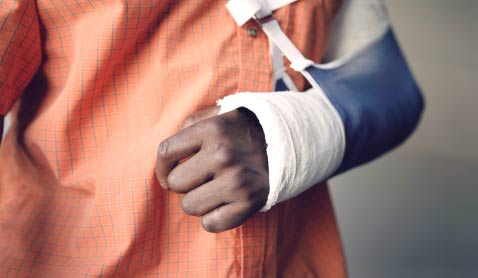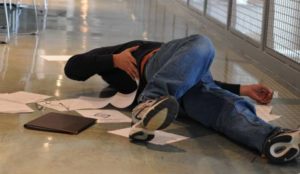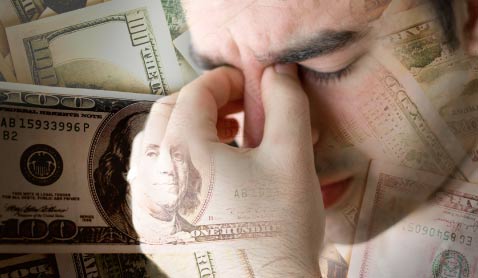Virginia Beach Slip and Fall Lawyers
Every year, there are about eight million fall victims admitted to the emergency room and of that number, 12 percent are slip and fall victims. Overall, between 20 to 30 percent of slip and fall accidents result in an injury. Most times, they cause minor injuries, such as cuts and scrapes, but depending on the circumstances, they could cause severe damage. When a victim slips and falls, they have a five percent chance of breaking a bone.
It is important for a victim to know their rights in these situations and what they need to prove to obtain compensation for their accident. While owners have a moral and legal obligation to ensure that their property is safe and clean for others who might legally be there, people also have an obligation to be mindful of their surroundings.
Common Slip and Fall Injuries

After suffering a slip and fall accident, it is best to figure out where the injury took place. Identifying the impacted area immediately allows for a better diagnosis from the doctor, which can translate to more effective medical treatment. Slip and fall accidents cause many types of injuries, including:
- Broken bones
- Sprained ankles or wrists
- Knee damage
- Shoulder dislocations or muscle strains
- Spine and nerve damage
- Traumatic brain injury
- Cuts and bruises
Who is Liable for a Virginia Beach Slip and Fall?
When a person has an accident on someone else’s property, the victim may incur medical bills that they expect the owner to compensate them for. However, when determining if a case is viable, it must be determined whether the owner is liable for the injury. In other words, did the negligence of their actions result in the victim slipping and falling? Lawyers will analyze three different scenarios. If only one of them is true, the owner could be held liable. Those situations are:
- The owner or employee at the location is personally responsible for the considerations that led to the fall. They did something deliberate to make that spot unsafe. They could have spilled something on the floor and not cleaned it up or tore a hole in the carpet forcing it to poke up, which could make it a tripping hazard.
- The owner or employee knew about the dangerous spot but did not do anything to fix the problem.
- The owner or employee of the facility should have known about the dangerous aspect of the floor because a reasonable person would have seen the danger and fixed it.
It is the third scenario that takes place more often in premises liability cases. However, it is also the most complex because of various areas of interpretation by a judge or jury. In the end, it usually comes down to common sense on the part of the owner and the victim.
Open and Obvious Clause
It has often been said that Virginia has some of the toughest standards to meet when it comes to determining an owner’s liability in slip and fall cases. That is not necessarily the case. While it is true that Virginia’s laws with regards to these matters are somewhat complex, the commonwealth’s standard is no more stringent than other states in the union. Virginia utilizes an open and obvious clause, which attempts to determine if the defendant was negligent or if the plaintiff was contributively negligent. If the defense can prove either one of these cases, then a plaintiff case will be barred from recovery.
Also, in Virginia, the law allows for some accommodations of property owners in that they do not necessarily have to guarantee the safety of the people who visit their property. That means just because someone gets hurt on someone else’s property, it does not mean that victim can turn around and sue the owner.
Which Slip and Fall Cases are Viable?

There must be substantial injuries endured by the victim in a slip and fall case. If a person falls and sustains minor cuts and bruises, then it might not be in their best interest to pursue a case. Given the complexity of Virginia law, it might not make sense to spend the money and time on a case that would be difficult to prove liability.
Fighting for Liability in the Commonwealth of Virginia
As stated, Virginia has some of the most complicated slip and fall laws in the country. Therefore, it is difficult to prove liability in the commonwealth. When a person slips somewhere, the plaintiff must prove that the owner or employee had a dangerous condition that caused the floor to be unsafe. The plaintiff must also prove that the owner or employee knew of the dangerous condition in enough time that they would have had the time to fix it.
While that can be quite a difficult mountain to traverse when attempting to gain monetary damages for a client, the courts have not made the road any easier. Case law has established that the plaintiff must demonstrate that the conditions that led to their fall were created more than 20 seconds before the accident. They must also prove that the owner was responsible for the dangerous circumstances and not a fellow customer.
What Should be Done After a Virginia Beach Slip and Fall?
Many people will unfortunately suffer from a slip and fall accident at some point in their lives. Sadly, for some, that accident will not be a simple slip, but a major stumble that can cause severe injuries. The owner of a property has an obligation to maintain their property so that it is safe for guests to traverse. This is known as premises liability. In other words, if a person is seriously injured due to an owner’s negligence, the victim is entitled to be compensated for their expenses.
Given the complexity of Virginia law on the subject, it is vitally important that victims follow a few basic steps after they suffered a fall. While it might be hard to remember these steps soon after such a sudden and shocking event like a fall, they are important and could have a direct impact on the success of a person’s liability case.
- Seek medical help: The priority needs to be the health and well-being of the victim. After a fall takes place, the victim should go to a doctor immediately, assuming the accident does not justify the need for EMTs. The victim should keep all medical records and bills from that doctor’s visit as evidence in any upcoming litigation.
- Detail the incident in writing: Regardless of the location of the fall, the victim should report the incident. If it was at a store or commercial property, they can report the incident to a manager. If it took place in a residential building, they could notify the landlord. The victim should describe the incident in as much detail as they can remember and request a copy of the report for their own records.
- Get witnesses: If possible, the victim should speak to anyone who might have witnessed the accident who can testify about the conditions that led to it. The person should get the names and numbers of those willing to talk. That way, if the victim decides to file a lawsuit, their lawyer can get in touch with them. In addition, the victim should take pictures of the scene of the accident with a special focus on the specific conditions that caused the accident, such as a spill or similar conditions.
- Stay quiet: Victims should not share too much with people who might represent the property owner, like a landlord or manager. They should limit their statements and not speak with an insurance company before speaking with a lawyer. When speaking to people, the victim should not blame anyone nor take responsibility for the incident themselves.
- Seek legal advice: If a victim is going to move forward with a lawyer, the best way to go about doing that is by hiring an attorney who can help them through the legal process.
What can a Victim Receive in a Lawsuit?

Many times, victims of slip and fall accidents sustain major injuries, depending on the circumstances related to that fall. The resulting injury could have a significant impact on a person. If there was negligence on the part of the owner, the victim is entitled to receive compensation for their injuries. Among some of the financial compensation they can push for includes:
- Medical bills: When a person sustains an injury, they can push for the owner of the facility where the fall took place to pay for any medical costs incurred because of the accident.
- Continuing medical care: Some injuries can have a long-term impact on a victim. A person can be suffering from nerve damage or have a head injury that could require ongoing medical treatment and care. These expenses could be the responsibility of the liable party.
- Lost wages: Depending on the severity of an injury, a victim might not be able to return to work right away, or they might be able to return, but at a reduced capacity. This person might not be able to earn as much as they were before the accident. The person responsible for the conditions that led to the fall should compensate the victim for those lost wages.
- Pain and suffering: A victim can sue for pain and suffering, along with their medical expenses. This covers the pain a person suffered because of the injury and the pain they will continue to suffer. They can also request compensation for the emotional toil of having endured the accident.
- Punitive damages: These act more as a punishment against the guilty party than a form of compensation for injuries. In Virginia, there is a cap of $350,000 on the amount of money a jury can reward a victim.
What is the Statute of Limitations for a Virginia Beach Slip and Fall?
Similar to Virginia’s other rules governing slip and fall accidents, the rules pertaining to the statute of limitations are also complicated. There are three separate deadlines victims have to file their respective cases. In a standard slip and fall case, a victim has two years from the date of the accident to file their case in Virginia’s civil court system. If a victim experienced property damage during the fall, they then have five years to file that lawsuit. This takes place if the victim was holding something like a cell phone and the fall caused them to drop it.
While rare, people can be killed due to slip and fall accidents. In those unfortunate instances, the victim’s family has two years to file a lawsuit in court.
Virginia allows the timeline to stop or toll, meaning a victim might have more than the two or five years to file their case. However, it is best to consult with a lawyer to determine what factors might cause a time frame to toll.
What Happens if the Victim is Partially Responsible for the Injury?
Virginia is one of the few states in the country that does not follow comparative negligence. Under that provision, a victim can be found to bear some responsibility for their accident. Under those conditions, they will be responsible for the percentage of the overall reward. Virginia does not subscribe to that theory and uses the more clear-cut contributory negligence standard. Under that standard, if the victim is found to bear any responsibility for the accident, they will not be entitled to collect any monetary reward for their injuries.
Given that strong defense tool, the property owner and their lawyer will make every attempt to assign blame or responsibility on the victim for the accident. If they are successful, they can avoid having to pay a large amount of money. Some of the arguments they will make include:
- Claiming that the victim was on a part of the property that visitors are not allowed and therefore should not have been there in the first place.
- The shoes that the victim was wearing were inappropriate for the surface they were walking on and thus led to the accident.
- The victim was not paying attention to where they were walking. The property owner might attempt to claim that the person was distracted because they were talking on their phone or something else.
- It should have been obvious to the victim that the condition of the floor was dangerous.
- The property owner made the effort to cordon off the dangerous area and highlighted it with signs and cones.
While it might seem as if this standard could make winning a case more difficult, it is also one that can negatively impact a settlement as well. If during negotiations, the property owner realizes that they can assign any level of blame to the victim, then they might threaten to take the matter to court.



